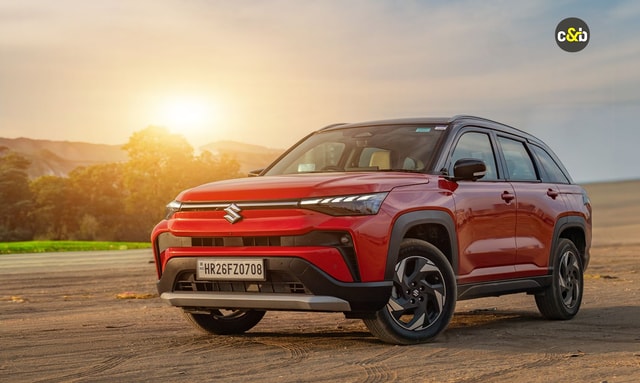Union Budget 2021: Luxury Carmakers Hope For Lower Taxes, Stable Policy And Incentives On EVs

- Mercedes-Benz seeks removal of compensation cess & incentives on EVs
- Audi India wants the government to rationalise the whole tax structure
- OEMs & industry experts both have voiced the need for a scrappage policy
The Union Minister of Finance, Nirmala Sitharaman is all set to announce the budget for Financial Year 2021-22, on February 1. Given the eventful year, we have had, the auto industry has some kind of relief expectations from the upcoming budget, considering it was one of the highly impacted sectors. The luxury car segment in particular, which has always been subjected to high taxation from the government, is also hoping to see lowered taxes and a stable policy regime, which will lessen the burden on them.
Also Read: Upcoming Luxury Car Launches In 2021

Santosh Iyer, Vice-President, Sales & Marketing, Mercedes-Benz India says there is a need for incentivizing OEMs for enabling local manufacturing of EVs
Speaking about his expectations from the upcoming 2021 Union Budget, Santosh Iyer, Vice-President, Sales & Marketing, Mercedes-Benz India said "The auto industry has shown tremendous resilience in pushing back the pandemic, and now needs firm measures from the government to create customer demand and recover the lost volumes. Rationalisation of taxes in the mid to long term, gradual abolition of compensation cess, and incentivizing OEMs for enabling local manufacturing of EVs are some of the specific wishes from the luxury car perspective. Given the potential and growing awareness of e-mobility, we recommend reduction in the import duties of EV, which we are confident will accelerate faster adoption of such vehicles, and in turn encourage luxury OEM's to consider local manufacturing of technologically advanced and world-class EV's in the country, in the long run."
Also Read: Expect To See Major Growth In The Pre-Owned Luxury Car Segment In 2021: Industry Experts
Earlier in 2020, Mercedes-Benz India became the first luxury carmaker in India to launch a fully electric car with the new EQC electric SUV. Launched at under Rs. 1 crore (on-road) the first batch of the electric SUV is already sold out.

Burdened under high duties, GST, Cess and registration costs, we urge the Government to rationalize the whole tax structure, says Balbir Singh Dillon, Head of Audi India
Balbir Singh Dillon, Head of Audi India, on the other hand, said, "The luxury automotive industry faced even stronger headwinds and sales plummeted to a 10-year low. While there has been a partial recovery during the last few months, we anticipate strong support from the Government to bolster growth in this segment. Luxury car sales contribute to under 1 per cent of the overall passenger vehicle sales in India, which is far below the levels in most comparable economies."
Pressing on the need for a stable policy regime for the luxury car segment, Dillon further added, "Burdened under high duties, GST, Cess and registration costs, we urge the Government to rationalise the whole tax structure, which eventually will lead to higher volumes and revenues for the state. Equally important is a stable policy regime for an uninterrupted business due to long lead times, which is specific to the luxury automotive industry."

Industry expert Avik Chattopadhyay says OEMs need to make their vehicles more affordable through tactics like leasing
Echoing Dhillon's views, Auto Industry Expert, Rakesh Batra, said, "The government needs to recognise this (auto sector) as a priority industry and provide a structural policy for the auto industry." He also highlighted the need to sperate structural issues like high taxation on luxury cars, from the more immediate issues caused by the COVID-19 pandemic. On the other hand, sharing his views and expectation from the 2021 Budget, industry expert and Co-founder of brand strategy consultancy Expereal, Avik Chattopadhyay said, "For the luxury segment, I do not propose any reduction in GST. Things like compensation tax can be taken off. They need to make their vehicles more affordable through tactics like leasing etc." Chattopadhyay even said there should be no tax on all "green mobility" investments and products.
Talking about the need for a scrappage policy, Mercedes' Santosh Iyer said, "We are also hopeful that the roll-out of the scrappage policy will be implemented, benefitting the mass segment and positively impacting the environment. We also expect continuation of government spending on infrastructure projects and road network that have a positive rub-off on the automotive industry." The same sentiment was expressed by Chattopadhyay, who said, the government needs to bring forward the scrappage policy to April 2021.
The uber luxury segment too is growing fast in the country and which carmaker knows this better than Lamborghini. It too is looking for some relief when it comes the GST structure. Sharad Agarwal, Head, Lamborghini India said, “The super luxury segment in India is niche and does not represent the true potential of the market. In the last decade the segment has seen many ups and downs and has struggled to cross 300 mark in annual sales. India is home to the 4th largest population of millionaires in the Asia-Pacific region and 4th largest population of Billionaires in the world but India contributes to less than 1 per cent to the global luxury trade. For our country to revive back from the economic repercussions of COVID-19, government stimulus packages need to push consumer spending across segments. High taxation and frequent changes in rates have had a considerable impact on the super luxury segment in India. With 110% import duties, 28% GST and 22% additional cess makes India among the highest tax countries in the world and we expect the government to review the 22% cess on luxury cars in the upcoming budget to push the demand and drive the growth to its potential in the segment.”
Latest News
 Jaiveer Mehra | Feb 23, 2026Skoda Kushaq Facelift Production Commences Ahead Of LaunchThe facelifted Kushaq made its global debut last month with deliveries set to commence from March 2026.1 min read
Jaiveer Mehra | Feb 23, 2026Skoda Kushaq Facelift Production Commences Ahead Of LaunchThe facelifted Kushaq made its global debut last month with deliveries set to commence from March 2026.1 min read Jaiveer Mehra | Feb 23, 20262026 Isuzu D-Max Hi-Lander Launched At Rs 21.05 Lakh; Gets Automatic Gearbox Option, More FeaturesThe Hi-Lander continues to only be offered in 4x2 spec, but now packs in similar features as the base-spec V-Cross.1 min read
Jaiveer Mehra | Feb 23, 20262026 Isuzu D-Max Hi-Lander Launched At Rs 21.05 Lakh; Gets Automatic Gearbox Option, More FeaturesThe Hi-Lander continues to only be offered in 4x2 spec, but now packs in similar features as the base-spec V-Cross.1 min read car&bike Team | Feb 23, 2026KTM Ends Long-Term Partnership With KISKA DesignWith Bajaj Auto now the owner of KTM, the Austrian brand is shifting to in-house design but will still work with KISKA on some projects.1 min read
car&bike Team | Feb 23, 2026KTM Ends Long-Term Partnership With KISKA DesignWith Bajaj Auto now the owner of KTM, the Austrian brand is shifting to in-house design but will still work with KISKA on some projects.1 min read Jaiveer Mehra | Feb 22, 20262026 Isuzu D-Max V-Cross Gets New Features, Cosmetic Updates; Prices Start From Rs 25.50 LakhUpdates include the addition of a new 10.3-inch touchscreen & 360 degree cameras, among others; no 4x2 option.1 min read
Jaiveer Mehra | Feb 22, 20262026 Isuzu D-Max V-Cross Gets New Features, Cosmetic Updates; Prices Start From Rs 25.50 LakhUpdates include the addition of a new 10.3-inch touchscreen & 360 degree cameras, among others; no 4x2 option.1 min read car&bike Team | Feb 21, 2026Norton Atlas Spotted Testing In India Once AgainThe spied model appears to be the base version of the mid-capacity adventure tourer.1 min read
car&bike Team | Feb 21, 2026Norton Atlas Spotted Testing In India Once AgainThe spied model appears to be the base version of the mid-capacity adventure tourer.1 min read car&bike Team | Feb 21, 20262026 Tata Punch EV Facelift: Variants, Features, Prices ExplainedThe Punch EV facelift is offered in six variants and with two battery pack options. Here is a rundown of what each variant has to offer.1 min read
car&bike Team | Feb 21, 20262026 Tata Punch EV Facelift: Variants, Features, Prices ExplainedThe Punch EV facelift is offered in six variants and with two battery pack options. Here is a rundown of what each variant has to offer.1 min read
 Girish Karkera | Feb 20, 2026Road Test: 2025 VinFast VF7 AWD Sky InfinityFlagship all-electric SUV from the Vietnamese car maker gets most of the basics right.1 min read
Girish Karkera | Feb 20, 2026Road Test: 2025 VinFast VF7 AWD Sky InfinityFlagship all-electric SUV from the Vietnamese car maker gets most of the basics right.1 min read Jaiveer Mehra | Feb 18, 2026New BMW X3 30 Vs Mercedes-Benz GLC 300: Midsize Luxury SUV FaceoffWith the new X3 30, BMW has a direct competitor to the petrol GLC 300, but which is the luxury SUV for you?1 min read
Jaiveer Mehra | Feb 18, 2026New BMW X3 30 Vs Mercedes-Benz GLC 300: Midsize Luxury SUV FaceoffWith the new X3 30, BMW has a direct competitor to the petrol GLC 300, but which is the luxury SUV for you?1 min read Jafar Rizvi | Feb 15, 2026Maruti Suzuki Victoris: Long-Term Review - Report 1The Victoris is Maruti’s latest offering for the Indian market, and after spending some time with it, here are a few early impressions.1 min read
Jafar Rizvi | Feb 15, 2026Maruti Suzuki Victoris: Long-Term Review - Report 1The Victoris is Maruti’s latest offering for the Indian market, and after spending some time with it, here are a few early impressions.1 min read Bilal Firfiray | Feb 12, 2026BMW X3 30 xDrive M Sport Review: The Driver’s SUV ReturnsRange-toppingX3 30 xDrive M Sport brings back the fun with 255bhp and genuine enthusiast appeal. Does this performance-focused SUV stand out?5 mins read
Bilal Firfiray | Feb 12, 2026BMW X3 30 xDrive M Sport Review: The Driver’s SUV ReturnsRange-toppingX3 30 xDrive M Sport brings back the fun with 255bhp and genuine enthusiast appeal. Does this performance-focused SUV stand out?5 mins read Bilal Firfiray | Feb 11, 2026Mercedes-AMG CLE 53 Coupe Review: The Goldilocks AMG?The Mercedes-AMG CLE 53 Coupe is a concoction of hooliganistic performance and everyday usability. Here’s why this Rs 1.5 crore two-door AMG might be the perfect modern sports coupe for India.6 mins read
Bilal Firfiray | Feb 11, 2026Mercedes-AMG CLE 53 Coupe Review: The Goldilocks AMG?The Mercedes-AMG CLE 53 Coupe is a concoction of hooliganistic performance and everyday usability. Here’s why this Rs 1.5 crore two-door AMG might be the perfect modern sports coupe for India.6 mins read
































































































































